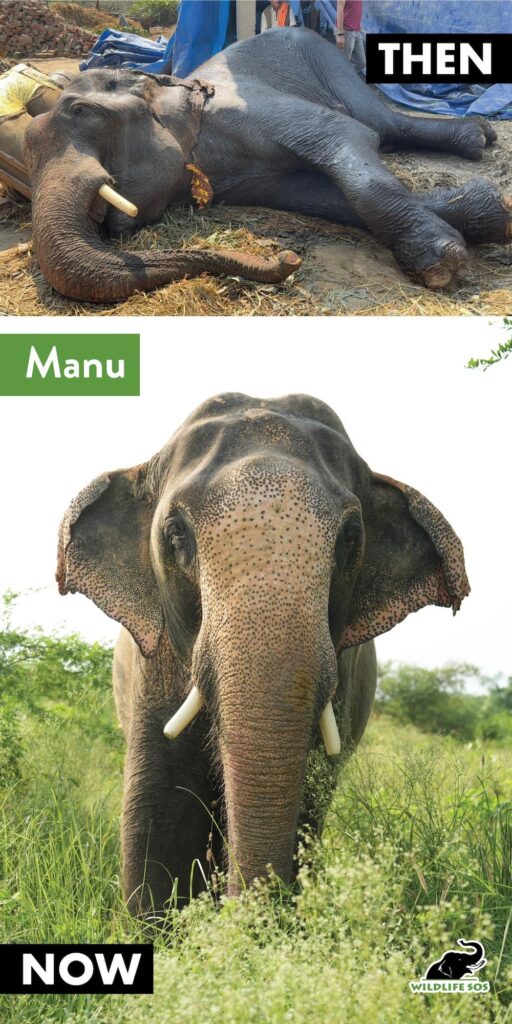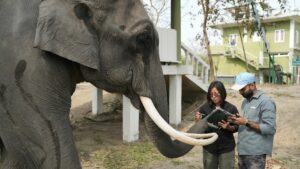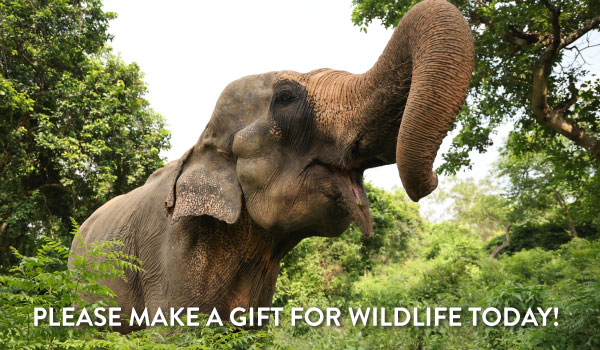Looking at photos of a poor shape of an elephant at the time of rescue, and then again just a few months later, can feel nothing short of miraculous.
Take Manu, for example. He was rescued in February 2025, weak and exhausted from years of hardship. Now, only months later, his transformation is astonishing — a living reminder that even when hope seems lost, recovery is possible.
Since Wildlife SOS’s work began, we’ve rescued more than 50 elephants, most of them ‘begging’ elephants who arrived in critical condition — physically broken, emotionally depleted, and yet still possessing an incredible will to live.Watching them come alive again has taught us what true care and compassion really means.

Here are 10 essential elements that every rescued elephant needs to heal and thrive:
1. Rest
In the wild, elephants get to lie down and sleep for several hours each night. Some of ours hadn’t rested lying down in years — chained too tightly or too injured to rise again if they tried.
At our centre, we build soft dirt mounds and supportive structures so they can finally rest in safety and comfort.
2. Movement
A wild elephant can roam dozens of kilometres a day. In captivity, many are forced to stand still for months, especially males chained during musth. This deprivation often leads to distress behaviours like head-bobbing or swaying, along with joint injuries and swelling.
Through daily walks and gentle activity, we help them rediscover what it means to move freely.
3. Nourishment
An elephant eats up to 330 pounds (150 kg) of food each day. But many rescued elephants arrive malnourished, either skeletal or obese from an unbalanced diet of scraps, garbage or unhealthy street food.
We provide a diverse, nutrient-rich diet to restore their strength — and their joy in eating.
4. Enrichment
Elephants are highly intelligent. In the wild, every day presents new challenges and stimulation. In captivity, boredom is profound.
Our enrichment team crafts puzzles, foraging games, and novel experiences to engage them in physical activity — reminding them what curiosity feels like, and awakening their minds.
5. Companionship
Many elephants we rescue have lived in isolation for decades.
Seeing them reach out, literally, to touch another elephant for the first time is unforgettable. They form deep bonds — with each other and, when trust grows, with the people who care for them.
6. Freedom
Freedom is more than space — it’s dignity.
The ability to scratch against a tree, choose where to walk, or simply decide when to bathe are small acts that mean everything. At our sanctuary, the chains come off, and free will returns.
7. Medical Care
Before rescue, elephants rarely receive any veterinary attention.
Foot infections, malnutrition, and untreated wounds can become life-threatening. Our veterinary and care teams design individualised, health plans for each elephant — addressing both physical and emotional healing.
8. Earth Beneath Their Feet
That familiar image of an elephant tossing sand over its back is more than charming — it’s vital. Sand cools the skin and protects from sun and insects.
Many urban elephants have forgotten this simple joy. Seeing them rediscover it, rolling in dirt and dust, is a quiet kind of triumph.
9. Water
Elephants are drawn to water — for drinking, bathing, and sheer play.
Some of our rescues are initially afraid of water, having been deprived of natural sources for so long. Gradually, they learn again to splash, soak, and revel. The joy in those moments is contagious.
10. Safety
Healing begins when fear ends.
Elephants who have lived under constant threat — beaten, starved, or overworked — must first learn that they are finally safe. At our centre, they can exhale. They can trust. And that trust changes everything.
As We Look Toward Giving Tuesday…
Over the coming weeks, we’ll share more “then-and-now” stories — living proof of what compassion can do.
Each transformation, like Manu’s, is made possible by a community of people who believe in second chances.
This Giving Tuesday, we invite you to stand with us in that belief — to help ensure that every elephant who needs rescue has the chance to rest, roam, and recover.
Every giver, and every gift, is lifesaving.








